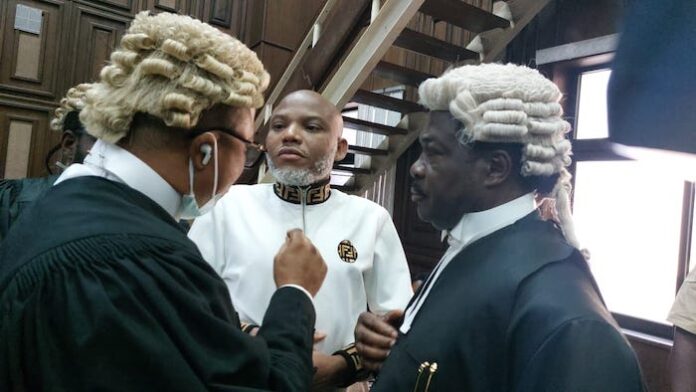A Federal High Court in Abuja dismissed a N1 billion lawsuit filed by Nnamdi Kanu, the detained leader of the proscribed Indigenous People of Biafra (IPOB), against the Federal Government and the Department of State Services (DSS) on Monday.
In his judgment, Justice James Omotosho ruled that Kanu failed to present credible evidence to support his claims of fundamental rights violations by the defendants.
Kanu had alleged that DSS operatives denied him unhindered access to his lawyers and eavesdropped on his conversations with them during the preparation of his defense. However, Justice Omotosho found that these claims could not be substantiated.
According to the News Agency of Nigeria (NAN), Kanu, through his lawyer Aloy Ejimakor, sued the Federal Republic of Nigeria (FRN), Attorney-General of the Federation (AGF), DSS, and its Director-General as the 1st to 4th respondents, respectively.
In the originating summons marked FHC/ABJ/CS/1633/2023, dated and filed on December 4, 2023, Kanu sought eight reliefs.

Kanu sought a declaration that the respondents’ act of seizing and photocopying confidential legal documents brought to him by his lawyers constituted a denial of his right to be defended by legal practitioners of his choice.
He also sought a declaration that preventing his counsel from taking notes during professional discussions with him at DSS detention was unlawful.
Additionally, he requested a declaration that eavesdropping on his confidential conversations with his lawyers amounted to a denial of his rights.
Kanu further sought an injunction to prohibit the respondents from seizing and photocopying confidential legal documents brought to him by his lawyers.
He also requested an order mandating the respondents to jointly and severally pay N1 billion in damages for the mental, emotional, psychological, and other harm he suffered due to the alleged breach of his rights.
In a counter-affidavit dated and filed by the DSS on March 12, the security agency denied the allegations.
Yamuje Benye, a Legal Department staff member, deposed that 11 paragraphs in Kanu’s affidavit were untrue.
Benye stated that Kanu was in safe and secure custody of the DSS, not in solitary confinement, and that he had access to his family members and lawyers on visiting days without hindrance.
Benye also claimed that DSS personnel never seized or confiscated documents brought to Kanu by his lawyers and never denied his lawyers the liberty to perform their lawful duties.
Benye explained that while Kanu’s counsel were allowed moderate-sized notes or pads during visits, materials promoting IPOB ideals were resisted.
He added that Kanu consistently requested prayer books and religious materials, which were part of his fundamental human rights.
Benye mentioned that Justice Binta Nyako, presiding over Kanu’s criminal trial, had always maintained that visits should be supervised, as is standard practice worldwide.
He stated that Kanu and his counsel were permitted to consult and interact in one of the DSS’s best interview facilities.
He denied allegations of eavesdropping or recording their conversations, stating that all visitors to the DSS facility were subjected to normal security checks to prevent unauthorized materials from entering.
The FRN and the AGF, in their counter-affidavit, also urged the court to dismiss the suit, arguing that it was an abuse of court process, given that Kanu had already argued similar issues before Justice Nyako, and the matter was reserved for judgment.




